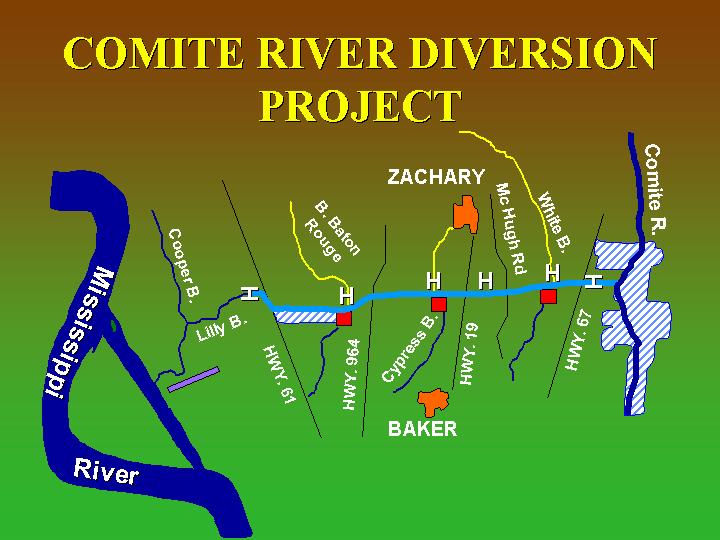
This will help save the city. Oops, a two year delay. Sorry about that.
A long-sought river diversion project to protect thousands of homes from flooding in the Baton Rouge region is likely to take another two years to finish due to delays from a major pipeline relocation, a top federal official acknowledged Thursday. State and federal officials overseeing the construction of Comite River Diversion Canal weren’t ready at first to say how much longer the 12-mile canal project will be delayed because of uncertainties surrounding the relocation. Shawn Wilson, secretary of the state Department of Transportation and Development, told a task force panel led by state Rep. Valaire Hodges, R-Denham Springs, that the picture could become clearer in six months. But, later, under questioning from panel members, Col. Stephen Murphy, head of the U.S. Army Corps of Engineers district in New Orleans, agreed it would likely be another two years from the end of 2022 to finish the job.
theadvocate.com
A pipeline has to be moved and why is this coming up now as the path has been set in the past.
Officials with the company that owns the Florida Gas pipeline said that, after reaching milestones in cost reimbursement negotiations with the state, they were ready to start the work necessary to apply for a federal permit to move the pipelines. Michael Futch, vice president of Energy Transfer, estimated that it would take his company about 11 to 12 months to do that preliminary work, seek a permit and move the pipelines. Even after the pipelines are moved, though, Corps officials said they would need another 15 months to finish their final piece of the project that is contingent on the pipeline relocation. Even without the complications from the pipeline relocations, state projects to build some of the new bridges necessary for the canal aren’t expected to be started and built for another year to a year and a half. Also, the estimate for the pipeline relocation could go far longer — another 18 months — if the size of the pipeline relocation triggers a more in-depth environmental review by the Federal Energy Regulatory Commission, Futch said.
Non of these excuses seem right. This should have been planned months if not years ago.
The diversion canal will slice through land between Baker and Zachary to tie the Comite to the Mississippi River. In the process, the canal’s planned path would disrupt bayous, highways, railroads and more than 60 underground pipelines. Talked about since the 1960s, the diversion canal took conceptual form after the historic 1983 flood. But, even as it moved through the Corps of Engineers review process, it remained starved for funding for years even as local residents contributed property tax revenue to help fund the canal. Before the latest round of construction, only one piece of the project, the multi-million-dollar Bayou Lilly control structure, was built and finished, in 2011. The rest of the of the project gained new momentum after the 2016 floods, which project backers say could have been lessened if the canal had existed. It was also helped by an influx of $343 million in cash from Congress to finish the job. Construction on the canal began in early 2019.
There are definite benefits to the project but it is sad this delay has to come.
U.S. Army Corps of Engineers estimates from the 1990s say the Amite River would be reduced by a little more than a foot at Denham Springs in a 100-year flood, or one that has a 1% chance of happening in any year. Flood reductions would be far greater farther north in East Baton Rouge in the Comite River basin but about half as much farther south in the Port Vincent area in Ascension and Livingston parishes. The canal is being built in segments, so slowdowns on one piece don’t necessarily affect others. But the work has still hit some snags. It was originally set to be completed by 2021.
One would have thought that the Corps and the state have done this enough that these planning problem would not happen. I guess not.

